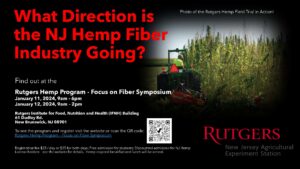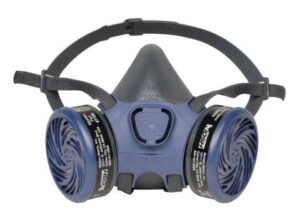2024 Rutgers Fiber Hemp Symposium. January 11-12

Rutgers Cooperative Extension
Joseph Paulin, Conservation Expert in Wildlife Management with Rutgers Cooperative Extension and NJAES, has published a new fact sheet FS1355 titled “Reducing Black Bear Damage to Farm Operations.” It is available to download or read online from the NJAES publications page here: <https://njaes.rutgers.edu/pubs/publication.php?pid=FS1355>
WORKSHOP: WPS RESPIRATORY PROTECTOIN TRAINING, FIT TESTING & RECORD KEEPING
Organizer and Host: PATRICIA HASTINGS Email: hastings@njaes.rutgers.edu
Thursday, February 8, 2024 at 9:00 AM – 1:00 PM (PRE-REGISTRATION REQUIRED-SPACE LIMITED)
LIMITED)
As part of the 2024 New Jersey Agricultural Convention and Trade Show, Rutgers Cooperative Extension is hosting educational sessions and workshops on Tuesday, February 6 through Thursday, February 8 at Harrah’s in Atlantic City. On Thursday morning pesticide applicators have a tremendous opportunity to be trained in respirator safety and fit testing. This workshop requires a separate registration (see instructions below to register) along with registration with VGANJ for the convention and trade show (available online or in person at the registration desk in the trade show area). For total list of educational events at the convention click here for Rutgers Educational Sessions. For more information about registering for the convention scroll to the bottom of the page on the Vegetable Growers Association of NJ’s Website.
Workshop Description: Revised WPS requires that agricultural employers provide all handlers (including family members) using a pesticide which requires respiratory protection with:
1) medical evaluation
2) fit testing of all tight-fitting respirators and
3) training per the requirements of 40 CFR 170.507 (b)(10).
This workshop aims to build the capacity of NJ agricultural establishments to protect their pesticide handlers from respiratory hazards. At this workshop, growers/applicators/their employees will receive class instruction and hands-on training in how to correctly select respiratory protection using the pesticide label statements of products used on their farm, train, and fit test others; and document the results to meet the requirements of the Revised WPS in NJ. Participants will be trained in pairs in how to properly conduct a qualitative fit test so that they can perform fit tests on the farm for as many masks and applicators as needed on their own. In rare cases, pesticide labels require respirators that legally require quantitative fit testing. Quantitative fit testing will be performed for those participants that need it. Training in the use of quantitative fit testing will not be provided to participants.
Workshop Pre-Requisites:
• Registration is given priority to growers/applicators/and their employees needing to expand capacity in respirator training, fit testing, and recordkeeping. Limited to the first 30 participants registering.
• Prior to fit testing or using a respirator, OSHA requires that the respirator user be medically evaluated. Each applicant must submit with their registration form a fully completed medical clearance by a physician or other licensed health care provider per OSHA 29 CFR 1910.1910.134(e)(6)9i.
• ALL attendees must pre-register by completing the 4-part registration form (including Part 4). Use the QR Code (right) to register or go to https://go.rutgers.edu/pesticideworkshop
Part 1: Participant Information
Part 2: List of Pesticides Used Which the Pesticide Label Requires Respiratory Protection
Part 3: Fit Testing Pre-requisites
Part 4: Submitting Your Respirator Workshop Pre-Registration Form
Day of the Workshop:
1) participants must be clean-shaven; use no lotions, aftershave, or makeup; or wear jewelry that interferes with the respirator sealing surface; certain facial hair such as mustaches are acceptable if they do not interfere with the inhalation or exhalation valve function.
2) Must bring respirator(s) they wish to be fit tested with fitted with N, R, or P filters; other makes models, and sizes of respirators will be available if fit cannot be achieved. Ordering information will be provided.
3) Each participant will receive a Workshop Certificate plus a completed “Fit Test Record” and “Respirator Training Record” form and wallet card.
PRESENTERS:
Respiratory Protection for Pesticides, Patricia D. Hastings, Rutgers Pesticide Safety Education Coordinator
Medical Evaluation and Fit Testing, Robin Tutor-Marcom, PhD, Director, NC AgroMedicine Institute
NJDEP PESTICIDE CREDITS FOR ATTENDEES: CORE-8 CREDITS
Wednesday, November 29th at 10:00 a.m.
The Dual-Use Solar Energy Act aims to facilitate solar projects on working farmland, while keeping the farmland in continued agricultural production. The pilot program seeks up to 200 MW generating capacity from dual-use solar in the first 3 years, with additional capacity if program is extended. The Pilot Program will serve as the basis for a permanent dual-use program in New Jersey.
The Board of Public Utilities (BPU), in conjunction with the NJ Department of Agriculture and the Rutgers Agrivoltaics Program have written a draft proposal for the rules that will implement the Dual-Use Solar Energy Act. The draft (straw proposal) is now open for public comment, with the intent of gathering stakeholder input.
For more information about the proposal and the Stakeholder Virtual Meeting, click the following link:
https://www.nj.gov/bpu/library/Dual%20Use%20Solar%20Energy%20Pilot%20Straw%20Proposal.pdf
To participate in the virtual meeting, you must register for the meeting at least 48 hours before the scheduled date. If you would like to speak during this Stakeholder Meeting, you must register via this form:
https://us06web.zoom.us/webinar/register/WN_9uOqbekdSrW25I3I4FeUKw
The BPU is also accepting written or electronic comments. All public comments should be
filed under Docket No. QO23090679 In the Matter of the Dual-Use Solar Energy Pilot Program.
The deadline for comments on this matter is 5 p.m. Eastern Time on December 13, 2023.
You can learn more about Agrivoltaics at the Rutger Agrivoltaics Program Website:
https://ecocomplex.rutgers.edu/agrivoltaics-research.html
Cooperating Agencies: Rutgers, The State University of New Jersey, U.S. Department of Agriculture, and Boards of County Commissioners. Rutgers Cooperative Extension, a unit of the Rutgers New Jersey Agricultural Experiment Station, is an equal opportunity program provider and employer.
Rutgers University is an equal access/equal opportunity institution. Individuals with disabilities are encouraged to direct suggestions, comments, or complaints concerning any accessibility issues with Rutgers web sites to: accessibility@rutgers.edu or complete the Report Accessibility Barrier or Provide Feedback Form.
Copyright © Rutgers, The State University of New Jersey, an equal opportunity, affirmative action institution
Copyright © 2025 · Generate Child Theme on Genesis Framework · WordPress · Log in